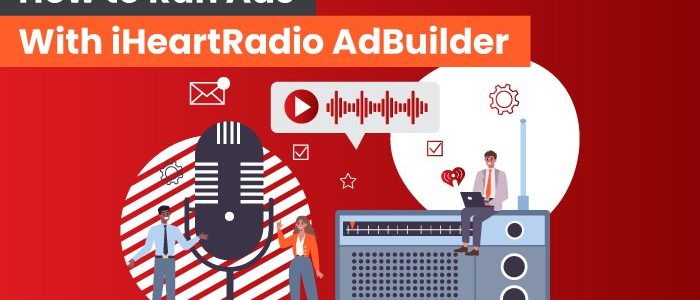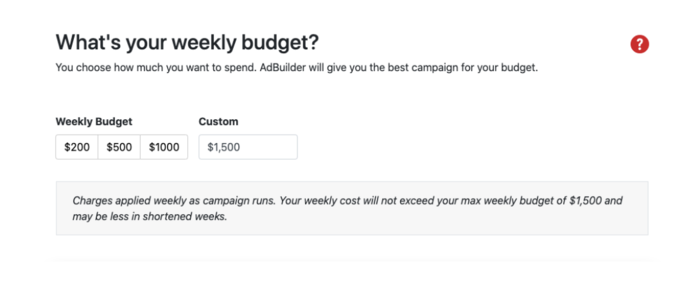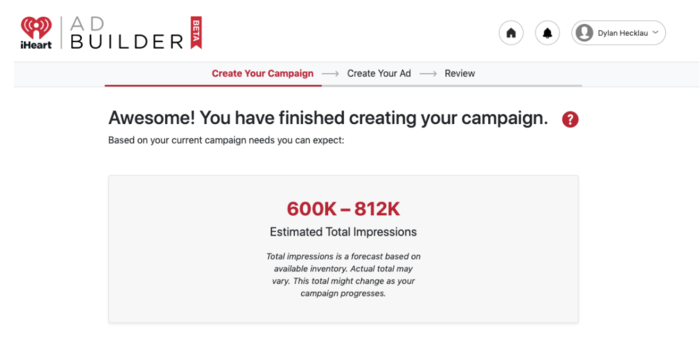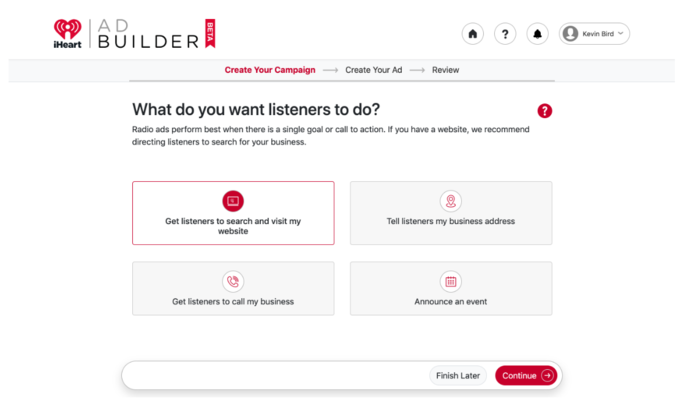
How to Run Ads With iHeartRadio AdBuilder
How do you maximize your exposure?
If you ask ten marketers this question, you’ll likely get lots of similar answers: Google Ads, social media marketing, etc. What you’re asking is which platforms offer massive traffic and have strong conversion rates.
Now, imagine you’re a marketer for a local business. How do you maximize your exposure now? Those digital campaigns with tons of traffic aren’t necessarily the answer for a brick-and-mortar store trying to get their community through the door.
There are plenty of businesses that desperately need to expand their reach but haven’t had a breakthrough with digital. That’s why today, we’re going to take a look at the potential of audio ads. iHeartRadio AdBuilder offers some ease and functionality to the world of radio ads, and it just might be a solution for local business owners.
What Are iHeartRadio Ads?
One of the most significant issues small-to-medium-sized businesses (SMBs) have had with audio advertising is it’s not particularly intuitive. The idea behind iHeartRadio’s AdBuilder was to create a programmatic solution automating this process.
AdBuilder is a self-service platform designed to help marketers create and promote audio ads. Beyond buying ad space, AdBuilder supports SMBs by using algorithms to target specific audiences.
SMBs can decide how much they’re comfortable spending, which cities they’d like their ads to play in, and how to focus on well-defined target audiences. AdBuilder radio spots are professionally written and produced with on-staff voice talent.
How Much Do iHeartRadio Ads Cost?
There’s no fixed cost with iHeartRadio Ads. What you pay is entirely up to you based on a series of options for your weekly budget. Depending on the market you choose, you see a minimum budget and a series of recommendations. You can also enter a custom amount of up to $30,000.

These costs purchase impressions, which are tracked on your account. Your weekly cost won’t exceed your max weekly budget and, even after your campaign is booked, you can modify dates and the budget for your campaigns.

Why Should You Run an iHeartRadio Ad?
Some marketers are looking for massive $30,000 nationwide campaigns; some want to spend $10,000. Some marketers have audio scripts ready; others have never written an audio script in their lives. The level of customization offered by iHeartRadio AdBuilder is unique and makes it worth checking out.
Of course, maximizing exposure is more than just a local business problem. Digital brands that want a specific type of customer or client can benefit from a national presence. Increased exposure means increased sales and can lead to higher quality engagement.
Whether you’re marketing for a local business or a national company, iHeartRadio AdBuilder may have something for you.
How to Set Up Your iHeartRadio Ad Campaign
Not only is iHeartRadio flexible, but it does its best to keep things simple. Setting up your campaign with them can be done in three steps.
- Provide Basic Information
Create an account and answer a few questions about your business and advertising goals. From there, you’ll determine your advertising goals, select target audiences, and pick a weekly budget. Their team of audio professionals produces a customized ad based on your goals and business.

- Approve iHeartRadio’s Ad
After they’ve produced your custom ad, you can listen to and approve the message. If needed, it can be revised (sometimes at no cost to you) and then be scheduled to play across iHeartRadio stations nationwide or locally.
- Your Ad Goes Live
Once your ad is approved, it goes live and starts airing. The iHeartRadio AdBuilder optimizes your ad budget to reach target audiences at particular times of day, using user data to target listeners via specific stations. You also have access to data reports once your campaign has ended.
5 Tips for an Effective iHeartRadio Ad Campaign
1. Understand the Medium
Savvy marketers take the time to learn about the perks and limitations of audio-only advertising.
One of the most compelling pros of audio advertising is its simplicity. You don’t need an expensive camera or someone to craft a heavily researched, complex article. Your iHeartRadio ad is meant to be consumed in 30 seconds, so minimalism is an absolute must here.
That said, the simplicity of these ads can feel limiting to marketers used to creating long-form content. If you’re struggling to wrap your head around what compelling audio content sounds like, there are a few stages to focus on: Capture, Excite, and Guide.
Breaking down the marketing process into these three stages can help clarify the audio marketing experience.
Capture
The Capture stage is about finding the memorable aspects of your brand and using them to disrupt your audience’s patterns. It’s not just about being controversial or unusual. Truly captivating moments properly and cleverly address your target audience’s pain points.
This moment is a reinterpretation of your elevator pitch, but there’s much more to it in the audio space.
The use of a particular sound effect, a unique jingle, and a specific style of voice actor can contribute to this aspect of advertiser storytelling. There’s a time for mentioning your brand and your unique selling point, but it’s not now. The script here should be more focused on creating mental images and bringing up emotions.
Excite
Now that you have your audience’s attention, it’s time to convince them your brand is worth considering. Be selective about the selling points you include.
Could you streamline five of your best- selling points and shove them into the 30-second ad? Probably. Should you? Not necessarily.
When you captured your audience, you tapped into their emotions and got them excited about your brand. If you start rattling off stats, you’re probably going to lose the excitement. Use one of your unique selling points to showcase what makes you different to keep the enthusiasm up.
Guide
When you guide your audience, you try to get them to follow through on the action you want them to take. Transitioning from excitement to sales is always tricky, but the right kind of call-to-action (CTA) can make this process much more manageable.
By streamlining the messaging and leading potential customers to more in-depth, comprehensive marketing (a landing page, for example), you can focus on making the iHeartRadio ad compelling instead of just informative.
2. Pick Your Target Audience Carefully
It may not be exciting, but ask any successful marketer, and they’ll tell you well-executed research is essential when developing a marketing strategy.
Over the years, the phrase “target market” has been used interchangeably with “target audience.”
A target market is broad (generation, income level, etc.) and tailored to particular groups due to interest, budget, access.
On the other hand, target audiences are specific groups within those target markets. If your target market is Millennials, your target audience may be post-college, female Millennials making at least $50,000 a year.
Good ad campaigns are for target markets. Great ad campaigns are for target audiences.
The specificity makes the research valuable, and knowing who your target audience is can help you make more relevant, compelling ads. With audio, you must understand which stations they listen to and what time of day they’re likely to listen. iHeart AdBuilder does this for you automatically.
3. Analyze Your Campaign Results Regularly
As your marketing campaign grows and evolves, you need to analyze its effectiveness properly.
One of the most valuable tools marketers can use is setting clear, strict deadlines and tangible goals for marketing initiatives.
Don’t just aim for an increased conversion rate; aim for specific numbers in a few metrics. Properly labeling your campaign goals like this sets your brand up for potential success with every new initiative.
If a new campaign performs well, you can identify which KPIs improved. If the new campaign doesn’t meet the projected goals, you can see which metrics underperformed and react accordingly.
4. A/B Test Different Campaigns
Marketers don’t live in a vacuum. More often than not, everyone brings their unique experience and perspective to the table. That human element can make advertising come to life, but it can also create a sort of cognitive bias we can’t always identify internally.
That’s why I recommend brands and marketers test two radically different marketing campaign approaches, especially if this is their first major campaign.
Maybe there’s a comedic iHeartRadio ad you’d like to make, but you’re worried it won’t resonate with your target audience. Perhaps you’re worried your simple iHeartRadio ad won’t stand out in a sea of dynamic competitor ads. This is the time to test out all those ideas.
As long as you’re setting clear, tangible goals and tracking the data, every experiment is a learning opportunity. Test every assumption your campaigns make. Collect more and more data to develop a clearer sense of what your audience responds to.
Once you’ve identified winning strategies, start to optimize.
5. Use Strong, Clear CTAs
Connecting with a target audience is hard enough, but turning connection into conversion is one of the biggest challenges marketers struggle with, iHeartRadio ad or otherwise.
When crafting a compelling CTA, your focus should be on words provoking emotion or enthusiasm. Simple things like adding an exclamation point can make a massive difference.
Pair your CTA with a compelling reason for taking the next step forward. Now, this demands a bit of awareness on your behalf. For example, are you moving this potential customer into the sales funnel or simply further down the marketing pipeline?
Find statements matching the commitment necessary to convert once potential customers reach the next stage. You’ll know you’re doing this right when you have a low bounce rate.
As for the actual language you’ll want to use, here are some options you can work into your ad:
- Sign up now.
- Sign up for free.
- Join free for one month.
- Get started today.
- Claim your free trial.
Conclusion
The most frustrating part of using a new marketing platform is the learning curve.
iHeart AdBuilder was seemingly designed with this problem in mind, taking the confusion and guesswork out of radio ads and replacing it with something both accessible and effective.
If your business needs a local boost, or you’re looking for a new way to reach your target audience, AdBuilder just might be the tool you need.
Are you considering radio ads? What kind of audiences are you hoping to target?
